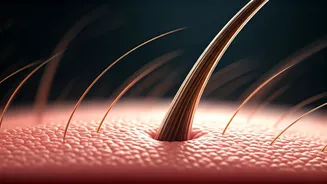Hair Loss's New Hope
Oral minoxidil has emerged as a promising remedy for hair loss, drawing significant attention in the medical community. Initially used for managing high
blood pressure, its unexpected effect on hair growth sparked interest. Doctors noticed that patients taking minoxidil experienced increased hair growth as a side effect. This led to further research into its use as a hair loss treatment. The medication works by widening blood vessels, which improves blood flow to hair follicles, stimulating growth. This accessibility and relatively low cost compared to other hair loss treatments have contributed to its growing popularity. However, it is essential to understand both its advantages and disadvantages to make an informed decision about its suitability for individual needs. People experiencing hair loss can benefit greatly from this treatment.
Who Benefits Most?
Oral minoxidil's effectiveness varies depending on the type and cause of hair loss. It proves most beneficial for individuals with androgenetic alopecia, commonly known as male-pattern or female-pattern baldness. This type of hair loss is often hereditary and involves the progressive thinning of hair. Oral minoxidil can stimulate hair growth in these cases by counteracting the effects of the hormone DHT, which contributes to hair follicle shrinkage. It can also aid in treating other forms of hair loss, such as alopecia areata, an autoimmune condition where the body attacks hair follicles. It may promote hair regrowth by stimulating the follicles. The treatment's benefits can extend to individuals with telogen effluvium, a temporary hair loss condition caused by stress, illness, or hormonal changes. However, the best results are generally observed in those with androgenetic alopecia. It is always wise to consult a dermatologist to determine if oral minoxidil is appropriate for specific hair loss conditions.
Safety First Concerns
While oral minoxidil is generally considered safe, certain precautions must be considered. As with any medication, side effects are possible. The most common side effects are typically mild and may include increased hair growth in unwanted areas (such as the face), skin irritation, and changes in blood pressure. However, more serious side effects can also occur, though infrequently. These include cardiovascular issues, such as palpitations or chest pain, and fluid retention. Before starting oral minoxidil, individuals with pre-existing heart conditions or kidney problems should consult their doctor. Regular monitoring, including blood pressure checks, may be necessary to minimize potential risks. It's also important to be aware of the dosage and to follow the instructions provided by a healthcare professional. Women who are pregnant or breastfeeding should generally avoid taking oral minoxidil, as its effects on the developing fetus or nursing infant are unknown. Discussing potential side effects and health history with a doctor is crucial for safe and effective use.
Effectiveness Examined
Several studies support oral minoxidil's effectiveness in promoting hair growth. Research has shown that a significant number of patients experience an improvement in hair density and thickness. It works by revitalizing hair follicles and extending the hair growth phase. Individual results can vary depending on factors such as the type of hair loss, dosage, and adherence to the treatment plan. It's important to have realistic expectations and understand that it may take several months to see noticeable results. Some people may observe visible improvements in hair growth within a few months, while others may take longer. To assess its efficacy, a doctor might monitor hair growth and scalp condition over several months. Consistent use and adherence to medical advice are crucial for achieving the best results. Compared to topical minoxidil, the oral form generally provides more widespread and potentially more effective results, as it reaches hair follicles through the bloodstream. However, a healthcare provider should assess these treatment options.
Actionable Next Steps
If you're interested in exploring oral minoxidil for hair loss, the first and most crucial step is to consult a dermatologist. Do not rely on information found online without professional medical guidance. The dermatologist can determine the cause of your hair loss and assess whether oral minoxidil is the right treatment for you. During the consultation, provide a detailed medical history and any medications you are taking. The dermatologist will discuss the potential benefits, risks, and side effects of oral minoxidil, as well as the appropriate dosage. They will also advise on how to monitor your progress and manage any potential side effects. After obtaining a prescription, follow the instructions provided by your doctor and pharmacist. Regular follow-up appointments with your dermatologist are essential to monitor your progress and make any necessary adjustments to your treatment plan. Remember, seeking professional medical advice is the most reliable way to make informed decisions about your health and well-being.












